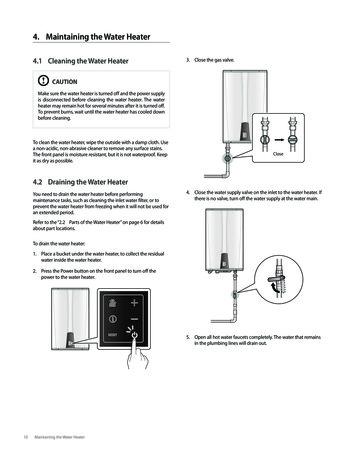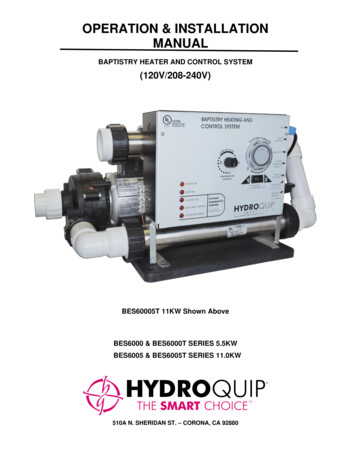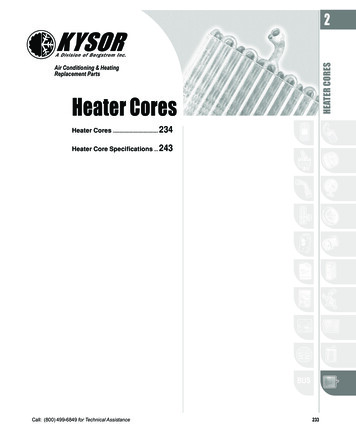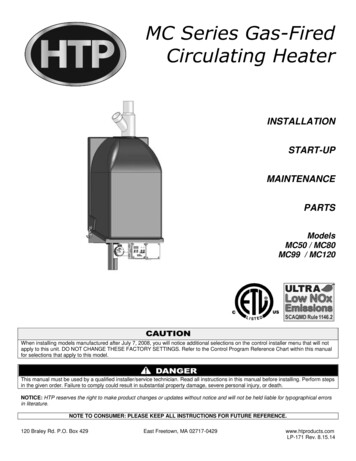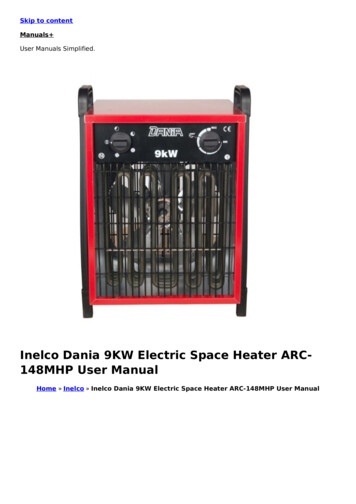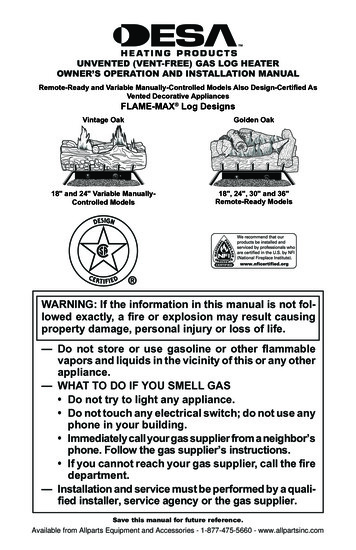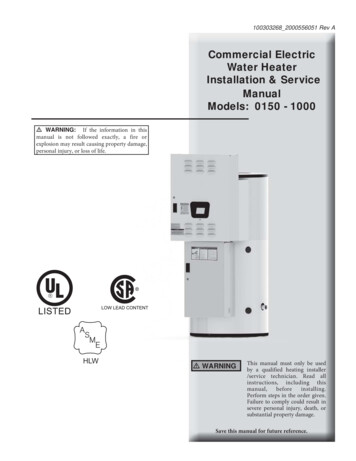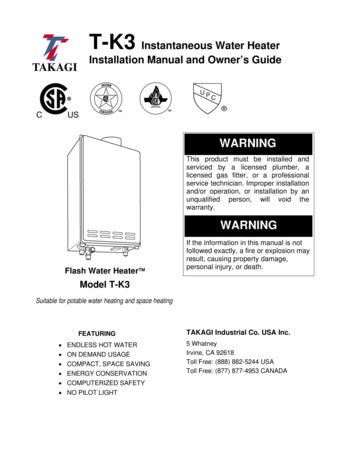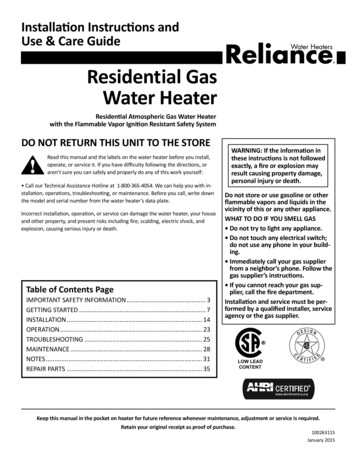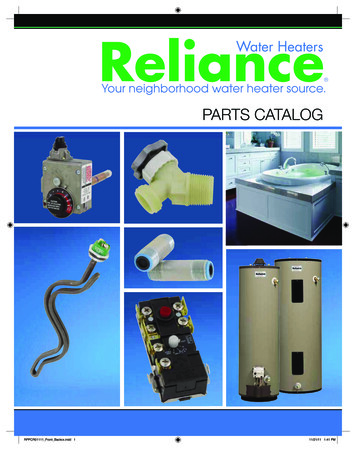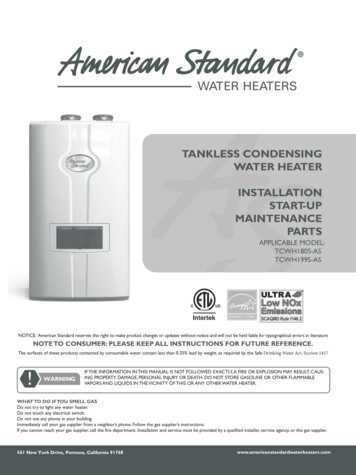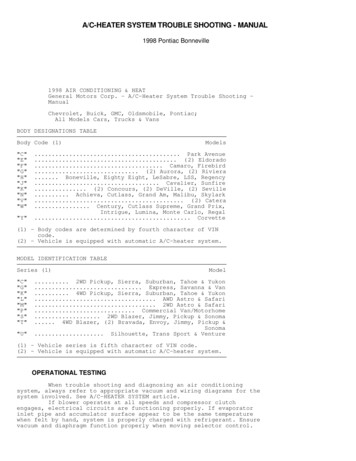
Transcription
A/C-HEATER SYSTEM TROUBLE SHOOTING - MANUAL 1998 Pontiac Bonneville1998 AIR CONDITIONING & HEATGeneral Motors Corp. - A/C-Heater System Trouble Shooting ManualChevrolet, Buick, GMC, Oldsmobile, Pontiac;All Models Cars, Trucks & VansBODY DESIGNATIONS TABLE Body Code (1)"C""E""F""G""H""J""K""N""V""W""Y"Models. Park Avenue. ( 2) Eldorado. Camaro, Firebird. (2) Aurora, (2) Riviera. Boneville, Eighty Eight, LeSabre, LSS, Regency. Cavalier, Sunfire. (2) Concours, (2) DeVille, (2) Seville. Achieva, Cutlass, Grand Am, Malibu, Skylark. ( 2) Catera. Century, Cutlass Supreme, Grand Prix,Intrigue, Lumina, Monte Carlo, Regal. Corvette(1) - Body codes are determined by fourth character of VINcode.(2) - Vehicle is equipped with automatic A/C-heater system. MODEL IDENTIFICATION TABLE Series (1)"C""G""K""L""M""P""S""T""U"Model. 2WD Pickup, Sierra, Suburban, Tahoe & Yukon. Express, Savanna & Van. 4WD Pickup, Sierra, Suburban, Tahoe & Yukon. AWD Astro & Safari. 2WD Astro & Safari. Commercial Van/Motorhome. 2WD Blazer, Jimmy, Pickup & Sonoma. 4WD Blazer, (2) Bravada, Envoy, Jimmy, Pickup &Sonoma. Silhouette, Trans Sport & Venture(1) - Vehicle series is fifth character of VIN code.(2) - Vehicle is equipped with automatic A/C-heater system. OPERATIONAL TESTINGWhen trouble shooting and diagnosing an air conditioningsystem, always refer to appropriate vacuum and wiring diagrams for thesystem involved. See A/C-HEATER SYSTEM article.If blower operates at all speeds and compressor clutchengages, electrical circuits are functioning properly. If evaporatorinlet pipe and accumulator surface appear to be the same temperaturewhen felt by hand, system is properly charged with refrigerant. Ensurevacuum and diaphragm function properly when moving selector control.
ELECTRICAL TROUBLE SHOOTINGBLOWER MOTOR WILL NOT RUNCheck fuses. Turn ignition switch to RUN position. Check forvoltage at function control switch. Place blower switch in HIposition. Check for voltage at switch and at high-speed blower relay.Ground blower motor with ignition switch in RUN position. If bloweroperates, motor is okay.BLOWER DOES NOT OPERATE IN HICheck for voltage at high-speed blower relay with ignitionswitch in RUN position and blower switch in HI position. If voltage isnot present, check for voltage at blower switch.BLOWER OPERATES ONLY IN HICheck blower resistors for open condition. Check blowerswitch for voltage at each position.A/C DOES NOT WORKWith engine running and function control switch at NORMposition, check for voltage at pressure cycling switch. Check forvoltage between pressure cycling switch and compressor clutch. Groundcompressor clutch circuit. If clutch engages, check wide-open throttlecut-out switch and A/C compressor cut-off switch.REFRIGERANT SYSTEM DIAGNOSISINSUFFICIENT COOLINGNOTE:Quick check procedure may be used to check for properrefrigerantcharge,provided ambient temperature is more than 70 F (21 C). On vehicles with Cycling Clutch OrificeTube (CCOT) system, compressor will cycle on and off to meetsystem requirements.Quick Check Procedure1) Engine must be at normal operating temperature. Openvehicle doors and hood. Select MAX A/C or RECIRC mode. Movetemperature lever to COLD position. Blower switch in HIGH position.Engine should be at normal idle speed.2) While compressor is engaged, feel temperature ofaccumulator surface and evaporator inlet pipe. If temperature of bothcomponents is the same, system is normal. If evaporator inlet pipe isfrosted or feels cooler than accumulator surface, refrigerant chargeis low.3) Add refrigerant in 4-ounce increments, allowing system tostabilize between additions, until accumulator and inlet pipe are thesame temperature. Add an additional 14 ounces of refrigerant.Thorough Check ProcedureBegin diagnosis at V5/TXV SYSTEM DIAGNOSIS (STEP 1) orV5/VDOT SYSTEM DIAGNOSIS (STEP 1). For further diagnosis, go toappropriate trouble shooting chart. SeeTROUBLE SHOOTING CHART DIRECTORY table.V5/TXV SYSTEM DIAGNOSIS (STEP 1)
Preliminary ChecksCheck and repair the following:**********Connect Tech 1 Scan Tool. Check for stored trouble codes. Ifcodes are found, see G - TESTS W/CODES in ENGINE PERFORMANCE.Check A/C fuse.Check A/C blower operation.On vehicles with cable operated temperature door, movetemperature lever rapidly from cold to hot. Listen fortemperature door hitting travel stops at each end. Adjust asnecessary.Check A/C compressor clutch coil connection.Check A/C pressure transducer connection.Check compressor belt condition. Adjust or replace asnecessary.Check cooling fan operation.Check for restricted airflow across condenser.Check Technical Service Bulletins (TSBs) for A/C systemupdates.V5/VDOT SYSTEM DIAGNOSIS (STEP 1)Preliminary ChecksCheck and repair the following:********Check A/C fuse.Check A/C blower operation.On vehicles with cable operated temperature door, movetemperature lever rapidly from cold to hot. Listen fortemperature door hitting travel stops at each end. Adjust asnecessary.Check clutch coil and connections at rear head switch(es).Check compressor belt condition. Adjust or replace asnecessary.Check cooling fan operation.Check for restricted airflow across condenser.Check Technical Service Bulletins (TSBs) for A/C systemupdates.If discharge air temperature with A/C on is normal aftermaking repairs, system is operating properly. If further troubleshooting is required, go to appropriate trouble shooting chart. SeeTROUBLE SHOOTING CHART DIRECTORY table.HEATER SYSTEM DIAGNOSISHEATER OUTPUT TEMPERATURE CHECK1) Select heater (floor) mode, high temperature setting andhigh blower speed. Idle engine for about 20 minutes or until enginereaches normal operating temperature.2) Drive vehicle at 30 MPH (48 km/h). Measure ambient airtemperature and floor outlet air temperature. If floor outlet airtemperature exceeds minimum specification, heater output temperatureis considered sufficient. See HEATER OUTPUT TEMPERATURE MINIMUMSPECIFICATIONS table.HEATER OUTPUT TEMPERATURE MINIMUM SPECIFICATIONS TABLE Floor OutletAir Ambient Air Temp. F ( C)Temp.F ( C)
0 (-18)25 (-4)50 (10)75 (24).110125140150(43)(50)(60)(66) FUNCTIONAL TEST1) Idle engine for about 20 minutes until warm or until thermostat opens. Ensure coolant temperature is about 194 F (90 C).Select bi-level mode. Move temperature lever to coldest temperaturesetting. Select high blower speed. Air should exit all outlets andshould be about the same temperature as outside air.2) Select vent mode. Air should exit vent outlets and shouldbe about the same temperature as outside air. Air should not exitfloor, defrost or window defogger outlets.3) Select heater (floor) mode. Most air should exit flooroutlets, with remaining air exiting defrost and window defoggeroutlets. Air should not exit vent outlets. Air should be about thesame temperature as outside air.4) Select blend (floor-defrost) mode. Equal volume of airshould exit defrost and floor outlets, with some air exiting sidewindow defogger outlets.5) Select defrost mode. Most air should exit defrost outlets,with a low volume of air exiting floor outlets.6) Select bi-level mode. Move temperature lever to maximumhot setting. Air should exit ventoutletsand its temperature should rapidly increase to about 131 F (55 C) or greater. For more preciseheater output temperature check, see HEATER OUTPUT TEMPERATURE CHECK.Defrost nozzle airflow volume should diminish and floor outlet airflowvolume may increase slightly.7) Move temperature lever to maximum cold setting. Airtemperature should decrease to about the same temperature as outsideair.8) Slowly turn blower motor speed control knob toward OFFposition. stopping briefly at each intermediate position to checkforce of airflow exiting instrument panel center outlets to hearblower noise. Airflow and blower noise should decrease noticeably ateach intermediate position.TROUBLE SHOOTING CHART DIRECTORY ApplicationFiguresCars, Light Trucks & Vans (1)CCOT System . 1-5V5/TXV System . 6-12V5/VDOT System . 13-19Heater System . 20-24(1) - Vehicles with Harrison V5 5-cylinder compressor use aVariable Displacement Orifice Tube (VDOT) or ThermalExpansion Valve (TXV) system, referred to as V5/VDOTand V5/TXV systems in this article. Vehicles with anyother compressor use the Cycling Clutch Orifice Tube(CCOT) system. INSUFFICIENT COOLING (CCOT SYSTEM)
Fig. 1: Insufficient Cooling Chart "A" (CCOT System)Courtesy of General Motors Corp.
Fig. 2: Insufficient Cooling Chart "B" (CCOT System)Courtesy of General Motors Corp.
Fig. 3: Insufficient Cooling Chart "C" (CCOT System)Courtesy of General Motors Corp.
Fig. 4: Insufficient Cooling Chart "D" (CCOT System)Courtesy of General Motors Corp.
Fig. 5: Insufficient Cooling Chart "E" (CCOT System)Courtesy of General Motors Corp.CHECKING REFRIGERANT CHARGE - STEP 2 (V5/TXV SYSTEM)
Fig. 6: Checking Refrigerant Charge - Step 2 (V5/TXV System)Courtesy of General Motors Corp.CHECKING COMPRESSOR CLUTCH ENGAGEMENT - STEP 3 (V5/TXVSYSTEM)
Fig. 7: Checking Clutch Engagement - Step 3 (V5/TXV System)Courtesy of General Motors Corp.CHECKING SYSTEM PERFORMANCE - STEP 4 (V5/TXV SYSTEM)
Fig. 8: Checking System Performance - Step 4 (V5/TXV System)Courtesy of General Motors Corp.PERFORMANCE DIAGNOSTIC CHART - STEP 5 (V5/TXV SYSTEM)
Fig. 9: Performance Diagnostic Chart - Step 5 (V5/TXV System)Courtesy of General Motors Corp.DIAGNOSTIC CODE PROCEDURES - STEP 6 (V5/TXV SYSTEM)
Fig. 10: Diagnostic Code Procedures - Step 6 (V5/TXV System)Courtesy of General Motors Corp.CHECKING FOR NO STROKE COMPRESSOR - STEP 7 (V5/TXV SYSTEM)
Fig. 11: Checking For No Stroke Compressor - Step 7 (V5/TXV System)Courtesy of General Motors Corp.CONTROL VALVE DIAGNOSIS - STEP 8 (V5/TXV SYSTEM)
Fig. 12: Control Valve Diagnosis - Step 8 (V5/TXV System)Courtesy of General Motors Corp.CHECKING REFRIGERANT CHARGE - STEP 2 (V5/VDOT SYSTEM)
Fig. 13: Checking Refrigerant Charge - Step 2 (V5/VDOT System)Courtesy of General Motors Corp.CHECKING COMPRESSOR CLUTCH ENGAGEMENT - STEP 3 (V5/VDOTSYSTEM)
Fig. 14: Checking Clutch Engagement - Step 3 (V5/VDOT System)Courtesy of General Motors Corp.CHECKING SYSTEM PERFORMANCE - STEP 4 (V5/VDOT SYSTEM)
Fig. 15: System Performance - Step 4 (V5/VDOT System - 1 Of 2)Courtesy of General Motors Corp.CHECKING SYSTEM PERFORMANCE - STEP 4 (Cont.) (V5/VDOT SYSTEM)
Fig. 16: System Performance - Step 4 (V5/VDOT System - 2 Of 2)Courtesy of General Motors Corp.RIGHT AREA DIAGNOSIS & SERVICE - STEP 5 (V5/VDOT SYSTEM)
Fig. 17: Right Area Diagnosis & Service - Step 5 (V5/VDOT System)Courtesy of General Motors Corp.LEFT AREA DIAGNOSIS & SERVICE - STEP 6 (V5/VDOT SYSTEM)
Fig. 18: Left Area Diagnosis & Service - Step 6 (V5/VDOT System)Courtesy of General Motors Corp.CONTROL VALVE DIAGNOSIS - STEP 7 (V5/VDOT SYSTEM)
Fig. 19: Control Valve Diagnosis - Step 7 (V5/VDOT System)Courtesy of General Motors Corp.INSUFFICIENT HEAT OR DEFROSTING
Fig. 20: Insufficient Heat or Defrosting (1 of 2)Courtesy of General Motors Corp.
Fig. 21: Insufficient Heat or Defrosting (2 of 2)Courtesy of General Motors Corp.TEMPERATURE CONTROL DIAGNOSIS
Fig. 22: Temperature Control DiagnosisCourtesy of General Motors Corp.BLOWER NOISE DIAGNOSIS
Fig. 23: Blower Noise Diagnosis (1 of 2)Courtesy of General Motors Corp.
Fig. 24: Blower Noise Diagnosis (2 of 2)Courtesy of General Motors Corp.
1998 AIR CONDITIONING & HEAT General Motors Corp. - A/C-Heater System Trouble Shooting - Manual Chevrolet, Buick, GMC, Oldsmobile, Pontiac; . switch in RUN position and blower switch in HI position. If voltage is not present, check for voltage at blower switch. BLOWER OPERATES ONLY IN HI Check blower resistors for open condition. Check blower
